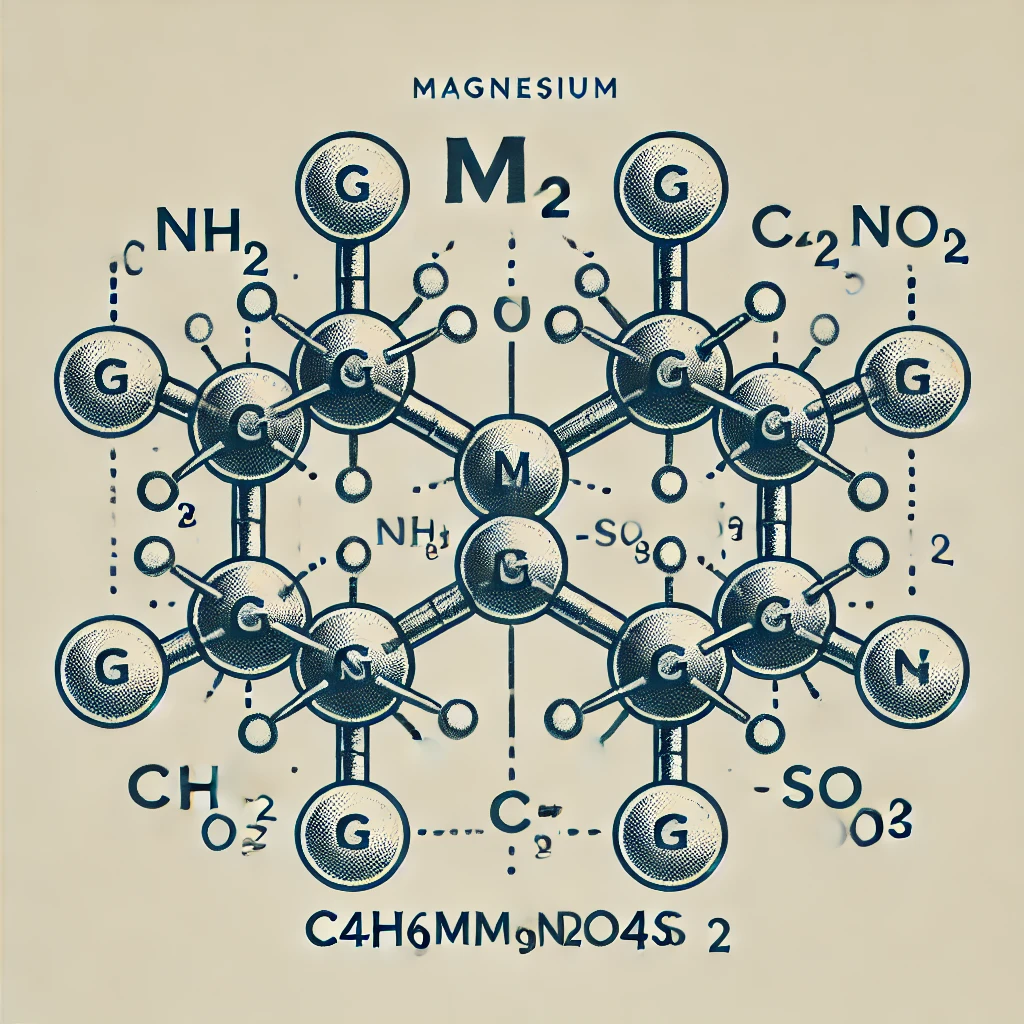In the ever-evolving landscape of nutritional supplements, certain compounds emerge that warrant special attention due to their unique properties and potential health benefits. Among these, magnesium taurate has been gaining significant recognition in recent years, particularly for its impressive cardiovascular and neurological benefits. As someone who has dedicated over a decade to researching and writing about nutritional supplements, I’ve observed a growing body of evidence suggesting that this particular form of magnesium might offer advantages that set it apart from other magnesium supplements. The combination of scientific backing and real-world results makes this an especially intriguing topic worth exploring in detail.

Understanding Magnesium Taurate: The Basics
To truly appreciate the potential of magnesium taurate, it’s essential to understand its fundamental composition and how it differs from other magnesium supplements available in the market. Magnesium taurate represents a sophisticated coupling of two powerful compounds: magnesium, an essential mineral involved in over 300 enzymatic reactions in the body, and taurine, a conditionally essential amino acid that plays crucial roles in cardiovascular health, nervous system function, and cellular homeostasis. This strategic combination isn’t just a random pairing; research suggests that the bond between magnesium and taurine creates a compound that demonstrates superior absorption characteristics and targeted benefits, particularly for cardiovascular tissue. Unlike other forms such as magnesium oxide or citrate, the taurate form appears to have a special affinity for heart and brain tissues, making it particularly valuable for these specific health applications.
The Cardiovascular Connection
The relationship between magnesium taurate and cardiovascular health represents one of the most compelling aspects of this supplement. Recent cardiovascular research on magnesium taurate has revealed fascinating insights into how this compound supports heart health through multiple mechanisms. Studies have shown that magnesium taurate may help maintain healthy blood pressure levels by supporting proper blood vessel function and promoting optimal calcium handling within cardiac cells. The synergistic effect of magnesium and taurine appears to create a more potent cardiovascular support system than either compound alone. This is particularly noteworthy because cardiovascular health remains a primary concern in modern healthcare, and finding natural compounds that can support heart health safely and effectively is of paramount importance. The research suggests that magnesium taurate’s ability to cross the blood-brain barrier and its high bioavailability make it an especially effective form for cardiovascular support.
Why Choose Magnesium Taurate Over Other Forms?
In the complex landscape of magnesium supplementation, the choice between different forms can significantly impact the benefits you receive. When comparing magnesium aspartate vs taurate, or evaluating magnesium taurate vs glycinate, several distinctive characteristics emerge that make the taurate form particularly appealing. The molecular structure of magnesium taurate creates a stable compound that appears to be more efficiently utilized by the body compared to other forms. This enhanced bioavailability means that a greater percentage of the magnesium you consume actually reaches its intended targets within your body. Furthermore, the taurine component isn’t merely a passive carrier – it actively contributes to the supplement’s overall benefits, creating a synergistic effect that enhances the properties of both compounds. This is particularly evident in its cardiovascular and neurological applications, where the combination appears to be more effective than either component alone.
The Benefits Package: What Makes It Special?
The comprehensive benefits of magnesium taurate extend far beyond basic mineral supplementation, creating a compelling case for its inclusion in health optimization strategies. At its core, this form of magnesium demonstrates remarkable versatility in supporting various bodily functions. The cardiovascular benefits are particularly noteworthy – studies have shown that magnesium taurate may help maintain healthy blood pressure levels through multiple mechanisms, including supporting proper endothelial function and promoting optimal calcium handling in cardiac cells. Beyond cardiovascular health, users frequently report improvements in sleep quality, reduction in anxiety levels, and enhanced cognitive function. The unique ability of magnesium taurate to cross the blood-brain barrier more effectively than other forms may explain its pronounced effects on neurological function. Additionally, the compound appears to support healthy insulin sensitivity and glucose metabolism, making it potentially valuable for metabolic health support.
Sleep and Anxiety: A Deeper Look
The impact of magnesium taurate on sleep and anxiety deserves special attention, as these benefits often intertwine with overall health and well-being. When examining what magnesium taurate is good for, sleep quality consistently emerges as a significant benefit. The mechanism appears to involve both the magnesium and taurine components working in concert to support GABA function, the primary inhibitory neurotransmitter in the brain. This action helps promote relaxation and may ease the transition into sleep. Furthermore, magnesium taurate’s effects on anxiety are particularly interesting – users often report a sense of calm without sedation, suggesting that this form might be especially beneficial for those seeking daytime anxiety support without compromising alertness. The compound’s ability to support healthy stress response systems in the body, combined with its potential neuroprotective properties, creates a comprehensive approach to mental wellness that sets it apart from other magnesium forms.
Getting the Dosage Right: A Personalized Approach
Understanding how much magnesium taurate to take requires careful consideration of multiple factors, as optimal dosing can vary significantly between individuals. The general recommendation of 200-400mg daily serves as a starting point, but several factors should influence your personal dosing strategy. These include your current magnesium status, overall health goals, medication interactions, and existing health conditions. For example, athletes or individuals under significant stress may benefit from doses at the higher end of the range, while those new to magnesium supplementation might start at the lower end. It’s crucial to consider that magnesium taurate’s superior absorption characteristics mean you might need less compared to other forms to achieve similar benefits. The timing of supplementation can also impact its effectiveness – many practitioners recommend dividing the daily dose to maintain steady magnesium levels throughout the day.
Timing and Optimization Strategies
The question of when to take magnesium taurate often arises in discussions about optimization. While the supplement can be taken at any time, certain timing strategies may enhance its benefits. Evening consumption tends to align well with the body’s natural circadian rhythms, particularly for those using it to support sleep quality. However, if you’re taking magnesium taurate for cardiovascular support or general health maintenance, splitting the dose between morning and evening might provide more consistent benefits. Factors to consider include your daily routine, meal timing (as taking it with food can improve absorption), and any other supplements or medications in your regimen. Some users report enhanced benefits when combining magnesium taurate with other nutrients that support its action, such as B-vitamins or potassium, though such combinations should be discussed with a healthcare provider.
The Blood Pressure Connection: Understanding the Mechanisms
The relationship between magnesium taurate and blood pressure regulation represents one of the most thoroughly researched aspects of this supplement. When considering whether magnesium taurate lowers blood pressure, it’s essential to understand the multiple mechanisms through which it may influence cardiovascular function. Research indicates that magnesium taurate supports healthy blood pressure through several pathways, including modulation of calcium channels, support of endothelial function, and promotion of proper vasodilation. The taurine component adds another layer of cardiovascular support, as it helps maintain proper calcium handling within cardiac cells and supports optimal electrical conductivity in heart tissue. Clinical observations suggest that individuals using magnesium taurate as part of a comprehensive health strategy often report improvements in their blood pressure readings, though it’s crucial to note that results can vary based on individual factors such as diet, lifestyle, and overall health status.

Forms and Bioavailability: Choosing the Right Delivery Method
The availability of magnesium taurate in various forms provides flexibility in how individuals can incorporate this supplement into their daily routine. Traditional magnesium taurate supplements typically come in capsule form, which offers convenience and precise dosing. However, magnesium taurate powder has gained popularity among those who prefer to customize their intake or who have difficulty swallowing pills. The powder form can be particularly advantageous as it allows for easy dose adjustments and can be mixed into beverages or smoothies. When comparing absorption rates between forms, research suggests that both capsules and powder can be equally effective when properly formulated. The key difference often lies in individual preference and lifestyle considerations. Some manufacturers have also developed combined formulations that pair magnesium taurate with complementary nutrients, though it’s important to evaluate these combinations carefully to ensure they align with your specific health goals.
Comparative Analysis: Magnesium Forms and Their Applications
In the ongoing discussion of magnesium taurate vs citrate and other forms, it’s crucial to understand the distinct advantages each type offers. While citrate forms are often praised for their high bioavailability and gentle laxative effect, magnesium taurate distinguishes itself through its targeted cardiovascular and neurological benefits. The bond between magnesium and taurine creates a compound that appears to have superior tissue penetration, particularly in cardiac and neural tissues. This specificity makes it especially valuable for individuals focusing on heart health, cognitive function, or stress management. Additionally, the taurate form tends to cause less gastrointestinal disturbance compared to other forms, making it suitable for those with sensitive digestive systems or those who have experienced discomfort with other magnesium supplements.
Safety Considerations and Long-term Usage
While magnesium taurate demonstrates an impressive safety profile, responsible supplementation requires attention to several key factors. First-time users should begin with a conservative dose to assess their individual tolerance and response. This approach allows for identification of any sensitivities and helps establish optimal dosing patterns. Long-term users should maintain regular communication with healthcare providers, particularly if they take medications or have underlying health conditions. Potential interactions with certain medications, especially those affecting cardiovascular function or blood pressure, warrant careful monitoring. Regular blood work to assess magnesium status and other relevant markers can help ensure optimal supplementation strategies. It’s also worth noting that while magnesium taurate is generally well-tolerated, maintaining proper hydration and mineral balance remains important for maximizing its benefits while minimizing any potential side effects.
Quality Considerations and Product Selection
The growing popularity of magnesium taurate has led to an expansion in available products, making quality assessment crucial for optimal results. When evaluating magnesium taurate supplements, several key factors deserve attention. Third-party testing verification provides assurance of product purity and potency, while GMP (Good Manufacturing Practice) certification indicates adherence to stringent production standards. Label transparency, including clear indication of the actual magnesium content (not just compound weight), helps ensure accurate dosing. Price considerations should be balanced against quality indicators, as superior formulations often require more sophisticated manufacturing processes and higher-grade raw materials. Additionally, examining the manufacturer’s reputation, including their history of product testing and quality control measures, can provide valuable insights into product reliability.
Let me conclude with the final key sections of this comprehensive guide to magnesium taurate:
Future Research and Emerging Applications
The scientific community continues to explore new applications and benefits of magnesium taurate, with several promising areas under investigation. Current magnesium taurate news highlights ongoing research into its potential role in cognitive health, metabolic function, and athletic performance. Preliminary studies suggest this compound may have broader applications than initially understood, particularly in areas of neurological health and cellular energy production. The growing interest from both researchers and healthcare practitioners indicates we may discover additional benefits as our understanding of this compound deepens.
Making an Informed Decision
When considering whether magnesium taurate is right for you, it’s essential to evaluate your specific health goals and current situation. The compound’s demonstrated benefits in cardiovascular health, sleep quality, and anxiety management make it a compelling choice for many individuals. However, success with supplementation often depends on proper integration into a comprehensive health strategy. This includes maintaining a balanced diet, regular exercise, adequate sleep, and stress management practices.
Final Recommendations
For those interested in incorporating magnesium taurate into their health regimen, consider these foundational guidelines:
Begin with a conservative dose and gradually adjust based on your body’s response. Work with healthcare providers to develop an appropriate supplementation strategy. Monitor your progress and any changes in your health markers. Choose high-quality supplements from reputable manufacturers. Maintain consistent usage patterns for optimal results.
Remember that while magnesium taurate offers significant potential benefits, it works best as part of a comprehensive approach to health and wellness. The key to success lies in understanding both its capabilities and limitations, allowing you to make informed decisions about your health optimization strategy.
Through careful consideration of these factors and proper implementation, magnesium taurate can be a valuable addition to your health and wellness routine, potentially supporting better cardiovascular health, improved sleep quality, and enhanced overall well-being.



